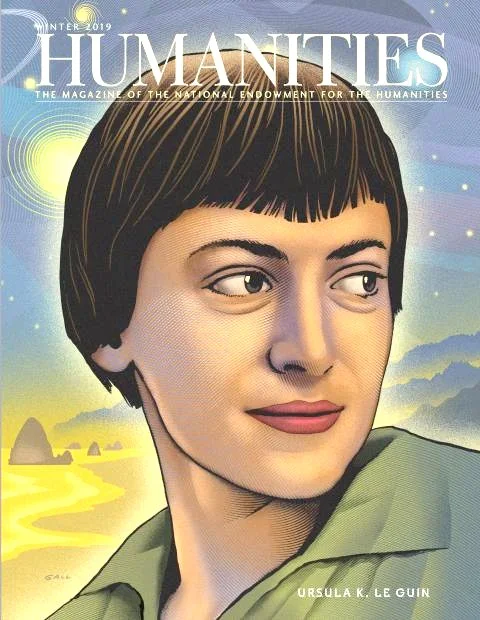I checked the Arts and Letters Daily compilation on Saturday, as I do periodically. I clicked on an article in the Humanities magazine on Ursula K. Le Guin, since I've been reading her essays, speeches and reviews in her last collection, Words Are My Matter, and I've just acquired a copy of her translations of the Tao Te Ching. I've already written about buying and reading her blog-inspired collection, No Time To Spare, last Christmas, shortly before she died, and a book of late interviews, Conversations On Writing this Christmas.
This isn't new for me--I've been reading her nonfiction since I came across her 1979 selection, The Language of Night (edited by Susan Wood.) What is new is that last month I had a personal breakthrough in reading her fiction. I'd admired her opus Always Coming Home, and recognized it as a special and very important work. I knew that earlier novels were also special and important in their time, and generally. But for some reason(s) or for none, I couldn't really get into her novels. I'd start them and then stop.
This didn't stop me from admiring her achievements, and learning from her nonfiction. I knew that someday I would be reading her fiction. I remember seeing the PBS dramatization of The Lathe of Heaven decades ago. In the 1990s, before we even thought of coming out here to live, Margaret and I were in Portland for a week. It was just before Christmas, and the Portland bookstores were hosting readings by local prominent writers. One of them was Ursula Le Guin. I made a point of getting us there, because Margaret had read many of her books. So (after introducing myself) I got to introduce Ursula to Margaret as the author of a play being produced by Portland Opera that coming weekend, one writer to another.
Recently Margaret chose The Lathe of Heaven for her book group to read. I took a look at it, and another of Margaret's copies of early paperbacks that I knew by its title, The Word For World Is Forest. I picked that one out, and began reading... And kept on reading.
A book (or an author) and a reader have to be ready for each other. And at last, I was in sync with the fiction of Ursula K. Le Guin. I went on quickly to The Left Hand of Darkness and the novel that utterly amazed me, The Dispossessed. I'll be moving on back to The Lathe of Heaven soon, and especially to Always Coming Home.
In any case, it was pure happenstance--I happened to check the Arts and Letters Daily site for the first time in weeks, happened to see the article on Le Guin, and made it my first click. It's the cover story in the magazine (published by the National Endowment of the Arts)--and what a cover: a stunning portrait of the young Ursula K. (That's it up top.) Le Guin is eminently quotable, and this piece has some good ones, including this, which can also be found in context in The Language of the Night:
When she received the National Book Award for children’s literature in 1973, she said much the same, urging the audience not to underestimate the truth-telling potential of imaginative literature. Fantasy writers, she told them, can speak seriously “about human life as it is lived, and as it might be lived, and as it ought to be lived. . . . It is above all by the imagination that we achieve perception, and compassion, and hope.”
The occasion for this Humanities article is a new documentary film on Le Guin that the Endowment partly sponsored: Worlds of Ursula K. Le Guin, directed by Arwen Curry. It looks destined for public television, but at the moment appears to be making the festival circuit, with some special screenings here and there.
So I got on the Internet, found the movie's site, and where the movie is showing. It was showing in one place: Arcata, California, where I just happen to live.
I know destiny when I see it, so Margaret and I went to this film on Sunday evening at the Miniplex, a comfortable (and separate) screening room that's part of Richard's Goat, a cocktail bar, which seems to be a currently fashionable kind of venue for millennials particularly. The film was in the early evening. There would be music later.
In addition to scenes with Le Guin herself over a ten year period (and selections from her famous six minute speech at the 2014 National Book Foundation), there were on-screen comments by Neil Gaiman, Margaret Atwood, Michael Chabon and others. There were several moving moments in this interesting, intelligent, visually inventive film. It was well-attended--a nice mix of ages in the audience, mostly couples.
Anyway, I'm glad we went, and if you are in Arcata, the next show is tonight. It will be here for the rest of February. Here's the schedule.















